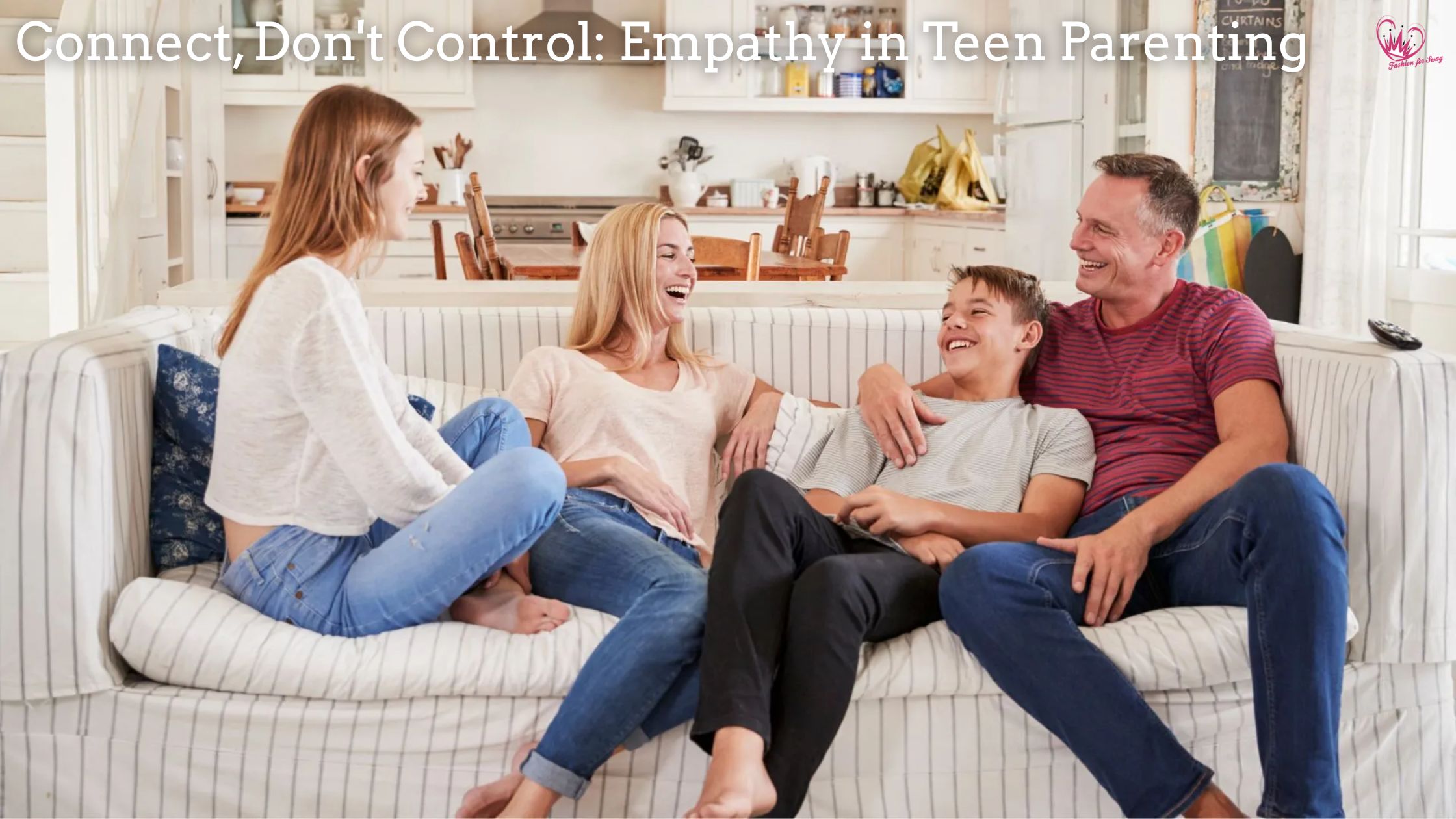
Connect, Don’t Control: Empathy in Teen Parenting
The journey through youth can feel like navigating turbulent waters – a duration of sizeable boom, speedy identification shifts, and often, increasingly more strained discern-youngster relationships. Faced with the unpredictable tides of teen development, many dads and moms instinctively reach for the helm, trying to “manipulate” their teenagers. This impulse, regularly fuelled by means of deep love, underlying fears for their baby’s protection, or societal pressures, can appear to be the maximum accountable direction. However, this control-centric technique frequently creates an accidental rift, main to cycles of defiance, secrecy, and a slow breakdown in critical verbal exchange. When teenagers feel unheard or excessively managed, their herbal pressure for independence frequently compels them to push away.
This weblog put up proposes a distinct, extra powerful solution: “Connect, Don’t Control.” This philosophy centers on empathy, which, severely, is not about permissiveness. Instead, it is approximately knowledge of your teenager’s internal world, validating their complicated emotions, and actively fostering a secure, trusting attachment. We will argue that embracing empathy over manipulation is the only nurturing way to navigate the tough teenage years, ultimately building more potent, greater resilient bonds, promoting open and honest conversation, and raising emotionally shrewd teens capable of thriving.
Understanding the Teenage Brain: Why Empathy is Essential
To genuinely “join, don’t manage,” parents ought to first grasp the super, but often baffling, modifications happening in the teenage brain. This length is not just about physical growth; it is a profound overhaul of neurological wiring that profoundly influences behavior, feelings, and selection-making.
- Brain Development:
- Prefrontal Cortex: The “govt management center” of the mind, chargeable for important functions like impulse control, reasoned selection-making, planning, and expert consequences, remains very a whole lot under construction. It won’t absolutely mature till a person’s mid-20s. This organic fact at once explains why young adults frequently showcase impulsivity, make illogical choices, and conflict with lengthy time periods when making plans. Their brains clearly aren’t absolutely prepared for it yet.
- Limbic System: Simultaneously, the limbic gadget, the brain’s emotional hub, is experiencing a surge in interest. This heightened emotional sensitivity means that teenagers frequently revel in emotions with an intensity that may be overwhelming to them and puzzling to adults. Their reactions may seem disproportionate; however, they may be rooted in this amplified emotional processing.
- Developmental Needs: Beyond brain chemistry, youth is a period of essential mental development.
- Identity Formation: Teens are on a vital quest to find out who they are, wonderful from their family unit. This adventure regularly entails testing obstacles, exploring one-of-a-kind roles, and a robust force for independence.
- Peer Influence: The significance of peer relationships escalates dramatically, with social attractiveness regularly taking priority.
- Autonomy: Underlying all these changes is a deep, innate need for greater autonomy and an actual voice in selections that have an effect on their lives.
- The Empathy Gap: Parents, running with fully evolved grownup brains, regularly discover it tough to keep in mind or absolutely recognize the raw intensity of those teenage studies and emotions. This creates an “empathy gap,” wherein grownup common-sense struggles to bridge the divide with adolescent feelings.
When mother and father react to tough youngster behaviors with strict control, lectures, or instant punishment, without acknowledging these underlying developmental factors, young adults feel profoundly misunderstood, unfairly judged, and emotionally alienated. This technique hinders their emotional and mental growth, pushing them further away in preference of drawing them closer.
Empathy vs. Control: A Fundamental Shift
The assessment of manage-based and empathetic parenting styles represents a fundamental shift in how we approach guiding teens. Understanding this difference is fundamental to fostering a healthier circle of relative dynamics.
Defining Control-Based Parenting:
- Characteristics: This method is usually marked by an emphasis on inflexible regulations, strict obedience, and the speedy software of punishment for any infractions. Parents may engage in micromanagement, dictating picks in place of guiding them, regularly adopting a “my way or the highway” stance.
- Underlying Fear: This fashion often stems from deep parental anxieties regarding their teenager’s safety, future fulfillment, or a pervasive worry of societal judgment if their baby deviates from perceived norms.
- Outcomes: The effects are frequently counterproductive: fostering revolt, encouraging secrecy, contributing to low shallowness, and hindering a youngster’s capacity to expand unbiased trouble-solving talents. Ultimately, it lines the determine-teenager courting, as young adults discover ways to avoid outcomes instead of sincerely knowing the effect of their actions.
Defining Empathetic Parenting:
- Characteristics: In assessment, empathetic parenting entails actively taking note of your youngster, validating their emotions (even when you don’t accept them as true with their behavior), striving to apprehend their unique attitude, and being attractive in collaborative problem-solving. Boundaries are still set but with true compassion and rationalization.
- Core Principle: The coronary heart of empathy is “feeling with” your youngster—displaying to them that you understand their internal international, their struggles, and their joys. It prioritizes connection and mutual respect over mere compliance.
- Outcomes: This method yields profoundly fantastic effects: accelerated acceptance as true with, more open and sincere verbal exchange, better shallowness, progressed emotional law, and greater resilience in the face of demanding situations. It strengthens the discern-youngster bond, making young adults feel heard, and respected, and drastically much more likely to be trying to find their mother and father’s guidance.
Distinguishing Empathy from Permissiveness:
- Crucial Clarification: It’s crucial to dispel the false impression that empathy equates to permissiveness. Empathetic parenting isn’t about letting teens do something they need or putting off all outcomes. Instead, it’s about organizing clear, constant boundaries with expertise and compassion. Consequences stay, however, they’re delivered calmly, linked without delay to the behavior, and centered on facilitating learning and boom, now not simply punishment.
- “Love is not sufficient, empathy is needed”: While a figure’s love is certainly the foundational element of any wholesome relationship, empathy provides the important equipment to navigate the complex emotional landscape of adolescence. It equips mother and father to assist young adults’ system difficult feelings and build the critical internal sources to rebound from difficulties and develop into well-adjusted adults.
Pillars of Empathetic Parenting: Practical Strategies
Shifting from managing to connection requires an intentional attempt and a toolkit of practical techniques. Here are key pillars to help you grasp empathetic parenting:
Master Empathetic Listening:
- Active Listening: This goes far beyond listening to words. It gives your youngster your undivided interest. Put down your phone, turn off the TV, and make eye touch. Signal that they are your sole awareness in that second.
- Validate Feelings: This is possibly the maximum important step. Acknowledge and call their emotions without always agreeing with their actions or immediately looking to “repair” the problem. Phrases like, “I listen you’re genuinely pissed off about that,” “It seems like you feel beaten,” or “I can see that is certainly provoking for you” show you recognize their inner revel.
- Reflect and Paraphrase: To make sure you have understood, rephrase what your youngster has said to your phrases. For instance, “So, if I’m understanding correctly, you’re disillusioned because your friend canceled plans at the final minute, and you feel let down?” This confirms information and gives them a risk to accurate you.
- Ask Open-Ended Questions: Encourage deeper sharing by asking questions that require greater than a “yes” or “no” answer. Instead of “Are you okay?”, attempt “What’s making you feel that manner?” or “Can you tell me more approximately what occurred?” Crucially, avoid “why” questions, which can regularly sound accusatory and place young adults on the defensive.
- Sit with Silence: Don’t feel pressured to fill every pause. Sometimes, a teenager needs a quiet area to acquire their thoughts, system emotions, or determine if they need to share extra. Your patient silence communicates that you’re truly listening and not just anticipating your flip to speak.
Communicate with Respect and Openness:
- Collaborative Problem-Solving: Involve your teenager in locating solutions to demanding situations. Instead of dictating, ask, “What do you observe might help in this example?” or “How are we able to work together to resolve this?” This empowers them and increases their purchase-in.
- Set Boundaries with Empathy: Boundaries are critical for safety and structure. When setting them, explain the why in the back of the regulations, focusing on safety, own family values, or nicely-being, instead of simply “due to the fact I stated so.” Invite their input on how guidelines might be implemented, even supposing the non-negotiable elements stay corporation. When effects are necessary, tell them evenly and always, linking them at once to the behavior, now not to your anger or unhappiness.
- “I” Statements: Express your feelings and worries without placing blame. For example, in preference to “You constantly make me fear while you don’t textual content back,” attempt “I sense worried when I don’t pay attention from you, because I care about your protection.” This focuses on your experience instead of criticizing theirs.
- Respect Privacy (is reasonable): Acknowledge your teen’s developing want for non-public areas and privacy as they expand independence. This doesn’t suggest ignoring warning signs and symptoms, but it does mean trusting them in which suitable and preserving traces of conversation open in order that they feel comfortable coming to you in the event that they want to.
Connect Through Shared Experiences:
- Find Common Interests: Make an effort to engage in sports your teenager enjoys, although it’s now not your personal favorite. This might be playing a video game with them, looking at a particular TV display, they love, or going to their favored coffee shop. Showing real hobby in their global build’s bridges.
- Quality Time: Beyond shared activities, make committed time for one-on-one interplay. This does not have to be intricate; a short vehicle journey, a walk, or without a doubt sharing a meal can provide opportunities for connection.
- Be Available: Let your teenager recognize, explicitly and implicitly, that you are usually there to speak, without judgment, every time they’re ready. They might push you away first of all, but your regular availability, without pressure, indicates unconditional aid. Don’t take their distance in my opinion; it is regularly a developmental section, now not a rejection.
Overcoming Challenges: When Connection Feels Elusive
Even with pleasant intentions and strategies, empathetic parenting is not an easy journey. There can be times whilst connection feels elusive, and demanding situations take a look at your resolve.
Teen Resistance:
- Expect it: It’s crucial to not forget that a teenager pushing away is an everyday and wholesome part of their developmental quest for independence. This resistance does not symbolize that your efforts are failing or that you’re an inadequate discern.
- Don’t surrender: Despite their aloofness, defiance, or grunts, retain to gently pursue connection. Your regular presence and persistence, even in the face of apparent rejection, alert unconditional love and availability, building a foundation they will sooner or later lean on.
- Self-mirrored image: When met with resistance, take a second to self-reflect. Ask yourself: Am I correcting an excessive amount of and listening too little? Am I lecturing in preference to asking open-ended questions? Am I making assumptions approximately their emotions or motives? Being open to adjusting your approach may be notably powerful.
Parental Burnout:
- It’s emotionally taxing: Empathetic parenting, with its emphasis on energetic listening, emotional validation, and consistent know-how, may be profoundly draining. It’s ok to feel annoyed, exhausted, or even harmed with the aid of a youngster’s behavior. Validate your very own emotions without judgment.
- Self-care is essential: Just as you pour into your teenager, you need to pour into yourself. Practice self-compassion, engage in activities that recharge you, and do not hesitate to look for guidance from dependent on friends, a companion, or assistance companies. You can’t effectively guide your youngster if your emotional well is dry.
When to Seek Outside Help:
- It’s vital to recognize when the demanding situations exceed your capability or when a teen’s behavior indicates deeper struggles. Look for signs that include persistent defiance that affects family lifestyles, excessive and extended emotional outbursts, sizeable withdrawal from social sports or circle of relatives, substance abuse, self-harm gestures or communication, or a drastic decline in instructional performance.
- In those situations, professional assistance is worthwhile. A therapist specializing in youth or a family counselor can provide objective tools, mediate verbal exchange, and assist each dad mom, and teenager navigate complicated issues with professional guidance.
Conclusion: The Enduring Power of Connection
Ultimately, embracing empathy over control transforms the figure-youngster relationship. This essential shift moves families far away from arduous strength struggles and in the direction of a dynamic of actual connection and mutual respect.
The benefits are profound and a ways-achieving. Empathy actively fosters deep acceptance as true, promotes open and honest communication, cultivates emotional intelligence, and builds essential resilience inside young adults. It empowers them to with a bit of luck navigate the complexities of early life and flourish into capable, properly-adjusted adults.
Parenting young adults is not about molding them into ideal beings or casting off all challenges. Instead, it’s approximately guiding them with profound expertise and unwavering aid. By consistently deciding to connect, rather than manipulate, we construct bridges that are robust sufficient to last a lifetime, ensuring a steady foundation for their future and a more harmonious, loving home surroundings today.



